11 Dec / Favorite Adult Books 2017 [in The Booklist Reader]

 What sweet agony to have so many fantabulous, freakin’ spectacular books from which to cull. I’ve got my 2017 favorite adult titles down to a baker’s dozen, chosen under great duress. They’re presented in alphabetical order – opposed to actually ranked, a feat which just might send me over the edge.
What sweet agony to have so many fantabulous, freakin’ spectacular books from which to cull. I’ve got my 2017 favorite adult titles down to a baker’s dozen, chosen under great duress. They’re presented in alphabetical order – opposed to actually ranked, a feat which just might send me over the edge.
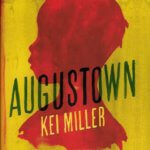 Augustown by Kei Miller
Augustown by Kei Miller
Teary Kaia comes home to his grandmother-cum-great-aunt Ma Taffy with his dreadlocks (the Rasta symbol of his Nazirite vow) hacked off by his teacher, who claims Kaia’s hair is a sign of insolence. Attempting to calm Kaia – and herself – Ma Taffy imparts “the story of the flying preacherman,” the (real-life) charlatan-turned-August Town prophet, Alexander Bedward. Over the decades, racial, political, economic dissonance plagues the Augustown-ies, especially threatening to Kaia’s mother, who was supposed to thrive, not just survive.
 Exit West by Mohsin Hamid
Exit West by Mohsin Hamid
Hamid’s exceptional, timely fourth novel showcases the impulses driving immigration, especially when rooted in violent conflict. In an unnamed city, Saeed and Nadia meet, fall in love, and plan their future together, but a militant takeover forces them to flee their homeland. Hamid reveals their journey, during which escape happens through “doors” only accessible via the right contact at the right price. Both mellifluous and jarring, Exit is a profound meditation on the unpredictable transience of human existence and the immeasurable cost of widespread enmity.
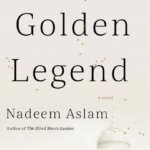 The Golden Legend by Nadeem Aslam
The Golden Legend by Nadeem Aslam
Aslam takes readers to a small stretch of Grand Trunk Road, Asia’s ancient thruway linking Bangladesh to Afghanistan, to fictional Zamana in contemporary Pakistan. One morning, an American stops his car on the historical thoroughfare and starts shooting. Among the dead is local architect Massud. Almost immediately, officials pressure Massud’s wife Nargis to publicly forgive the murderer – an alleged American diplomat – ostensibly to avoid an international incident. To save herself – and even more the lives of those she loves who still live – Nargis must flee, setting in motion a journey toward both liberation and damnation.
 The Great Passage by Shion Miura, translated by Juliet Winters Carpenter
The Great Passage by Shion Miura, translated by Juliet Winters Carpenter
At 27, Majime is recruited to help compile The Great Passage, an überdictionary destined to guide users across a vast sea of words. The socially awkward logophile embarks on an almost two-decade journey, during which he comes to understand the deepest meanings of friendship, dedication, and everlasting love. For Anglophone readers, this Japanese bestseller arrives as a symbiotic accomplishment: translator Carpenter renders the complicated Japanese wordplay of Miura’s whimsical original into an exceptional English delight.
 Her Body and Other Parties: Stories by Carmen Maria Machado
Her Body and Other Parties: Stories by Carmen Maria Machado
Equal parts fantasy, celluloid culture homage, dystopic apocalypse, even farce, Machado’s eight stories relentlessly defy labels. Women’s physical beings get shrunken in “Eight Bites,” and erased in “Real Women Have Bodies.” Women lose agency in “The Husband Stitch” and “Difficult at Parties.” A woman must face sudden parenthood in “Mothers.” A worldwide fatal plague gets parsed through an “Inventory” of lovers. Twelve seasons of Law & Order: SVU get pixelated into 272 “views” in “Especially Heinous.” And a writing residency turns horrific in “The Resident.” No body is safe.
 Home Fire by Kamila Shamsie
Home Fire by Kamila Shamsie
Shamsie’s utterly exquisite adaptation of Sophocles’ Antigone features two British-Pakistani families caught between loyalty, religion, politics, and the international war on terror. Although just one in a substantial library of Antigones through centuries, cultures, and countries, Shamsie’s latest is a compelling stand-out to be witnessed, honored, and deeply commended.
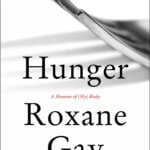
Hunger: A Memoir of (My) Body by Roxane Gay
“Every body has a story and a history,” Gay begins. The daughter of Haitian immigrants, raised upper-middle-class, Gay was smart, privileged, loved, and thin, like the rest of her family. Until she wasn’t: “What you need to know is that my life is split in two. . . there is the before and after. Before I gained weight. After I gained weight. Before I was raped. After I was raped.” Weight protected her, until her corpulence became a “cage” from which Gay attempts to write herself free: “This is a book about learning … to allow myself to be seen and understood.”
“Everyone had stories they told themselves to get through the days,” Deming Guo muses on his 22nd birthday, summing up a lifetime of leaving and being left. Deming, also known as Daniel Wilkinson, provides half of the dual narrative of Ko’s achingly insightful, gorgeously redemptive debut. The other half belongs to Deming’s “Mama,” also known as Peilan Guo, Polly Guo, and Polly Lin. In an uncertain world of what-if’s and what might/could/should-have-been’s, the pair searches for ways to live beyond mere survival.
 The Mountain by Paul Yoon
The Mountain by Paul Yoon
In Yoon’s second collection, loss and longing cause men and women to move, and often keep moving, sometimes in search of sanctuary, other times seeking escape. Criss-crossing the globe from the Hudson River to Shanghai, Sakhalin Island to Incheon, rural England to autonomous Spain, Yoon proves himself a literary alchemist, transforming tragedy into beauty with deft reminders of our universal connections.
Lee’s luminous, haunting epic covers almost a century, four generations, and three countries, depicting an ethnic Korean family that cannot even claim a single shared name because, as the opening line attests: “History has failed us.” In 1910, Japan annexes Korea, usurping the country while attempting to erase Korean identity. Amid the tragedies that follow, a Korean family migrates to Japan, where they live as second-class immigrants, where no level of achievement, integrity, or grit can change their status as reviled foreigners. Lee’s profound novel of losses and gains explored through the social and cultural implications of pachinko-parlor owners and users is shaped by impeccable research, meticulous plotting, and empathic perception.
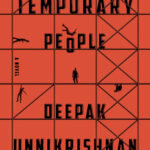 Temporary People by Deepak Unnikrishnan
Temporary People by Deepak Unnikrishnan
Unnikrishnan’s debut of (very) loosely interlinked stories is set in the United Arab Emirates, the country where he grew up, but can never claim as “home.” He gathers the tales of these temporary people who live as perpetual foreigners, as disposable workers with precarious futures. Combining surreal symbolism and linear narrative, wordplay and lists, family history and mythic retellings, Unnikrishnan uses fiction to “[illuminate] how temporary status affects psyches, families, memories, fables, and language(s).”
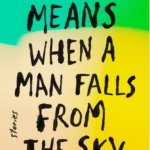 What It Means When a Man Falls from the Sky by Lesley Nneka Arimah
What It Means When a Man Falls from the Sky by Lesley Nneka Arimah
Unpredictable, original, and unique, Arimah’s dozen stories include motherless women who create phantom babies of hair, a family splintered by opportunity and distance, feuding gods, a resigned mother and daughter on the run, a mathematician who attempts to convert humanity into numbers. The UK-born, Nigerian- and U.S.-raised Arimah transforms her global citizenry into a magnificent fiction debut.
 You Don’t Have to Say You Love Me: A Memoir by Sherman Alexie
You Don’t Have to Say You Love Me: A Memoir by Sherman Alexie
Especially for audiophiles, if you listen to one book this year, choose this one: with his uniquely sing-songy cadence, almost-chuckles, and uncontainable tears, Alexie narrates the stories of his difficult youth, his lifesaving education, his struggles between familial obligations and leaving the Spokane Indian Reservation, the losses he faced and the gains he made to become “one of the Indians with the most social power.” Prompted by the 2015 death of his mother, Alexie delivers a book both “healing and wounding.”
Published: “Favorite Adult Books, 2017,” The Booklist Reader, December 6, 2013


